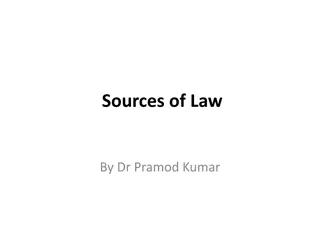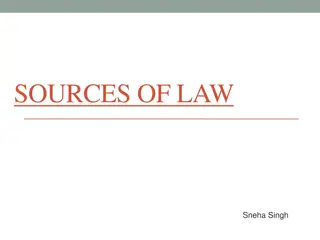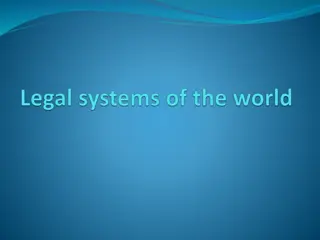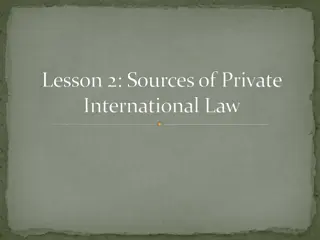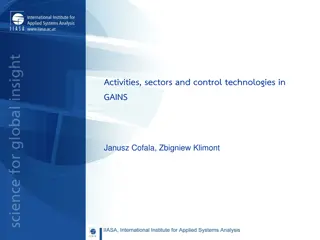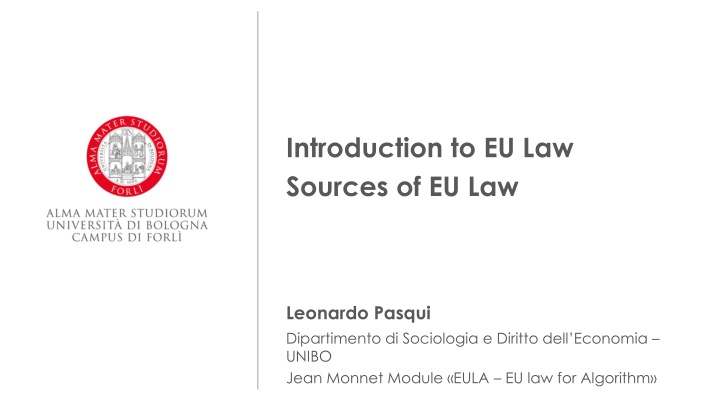
Evolution of EU Law: From Economic Integration to Social Europe
Explore the development of European Union law from its economic origins in the European Economic Community to the evolution into a Social Europe with the Single European Act and the Lisbon Treaty. Learn about the key milestones, including the creation of the internal market, enlargement phases, and the establishment of the EU pillars.
Download Presentation

Please find below an Image/Link to download the presentation.
The content on the website is provided AS IS for your information and personal use only. It may not be sold, licensed, or shared on other websites without obtaining consent from the author. If you encounter any issues during the download, it is possible that the publisher has removed the file from their server.
You are allowed to download the files provided on this website for personal or commercial use, subject to the condition that they are used lawfully. All files are the property of their respective owners.
The content on the website is provided AS IS for your information and personal use only. It may not be sold, licensed, or shared on other websites without obtaining consent from the author.
E N D
Presentation Transcript
Introduction to EU Law Sources of EU Law Leonardo Pasqui Dipartimento di Sociologia e Diritto dell Economia UNIBO Jean Monnet Module EULA EU law for Algorithm
The process - - 447 million people 27 Member States The process towards the European Union: - 1951: Community (ECSC) 1957: European Economic Community (Treaty of Rome) 1/01/1958: EEC - Euroatom ECSC: EEC was more than a customs union European Coal and Steel - - Creation of the internal market.
Internal market 1) Four freedoms: Free movement of natural persons, Free movement of goods, Free movement of services, Free movement of Capital. 2) State aid: limitation of public intervention in the economy. 3) Competition rules: Illegal contacts and agreements or Abuse of a dominant position Google case.
European Economic Community Six members: Belgium, France, Italy, Luxembourg, Netherlands, Federal Republic of Germany Merely an economic community devoted to the economic integration of the Member States. Social policy still marginal. Low autonomy to the EEC Institutions, bound to the Unanimous vote of the decisions. 70s: first enlargement (UK, Ireland, Denmark). 80s: second enlargement (Spain, Portugal, Greece) 1992: Treaty of Maastricht
European Union and the evolution of the Social Europe Single European Act (1986): reform of the internal market and introduction of Cohesion policy. EEC rebranded in European Union (EU) by the Maastricht Treaty1992 EU built on three pillars: - European Communities: ECsC, EC (European Community), Euratom - European foreign and security policy - Justice and home Affairs Schengen Convention: free movement of citizens (1995 Belgium, France, Germany, Luxembourg and Netherlands) -> extended to EU in 1999 1997-2000: a period in which the economy should tend to a sustainable growth and to a higher level of social cohesion. December 2000: Charter of Fundamental rights of the European Union (soft law act until 2009)
Lisbon Treaty Proclaimed in 2007 in force from 2009. Modifications to the Treaties: - Treaty on the European Union (general principles) - Treaty on the Fuctioning of the European Union (rules for the functioning and EU s policies). The Lisbon Treaty updated European Union (EU) regulations, establishing more centralized leadership and foreign policy, a process for countries that want to leave the EU, and a streamlined process for enacting new policies. The main change brought in by the Lisbon Treaty is the introduction of co-decision as the ordinary legislative procedure which means the European Parliament will now be playing an equal role with the Council in all legislative policy decisions in the area of agriculture, for example the next reform of the CAP. Finally, the Acquis Communutaire has been consolidated.
Acquis Communautaire The EU's 'acquis' is the body of common rights and obligations that are binding on all EU countries, as EU Members. It is constantly evolving and comprises: the content, principles and political objectives of the Treaties; legislation adopted in application of the treaties and the case law of the Court of Justice of the EU; declarations and resolutions adopted by the EU; measures relating to the common foreign and security policy; measures relating to justice and home affairs; international agreements concluded by the EU and those concluded by the EU countries between themselves in the field of the EU's activities.
Treaties Primary law: - Treaty on the European Union (general principles) - Treaty on the Fuctioning of the European Union (rules for the functioning and EU s policies). They proclaim the principles, the fundamental rights, the rules and procedures that EU institutions and MS should adopt within the framework of the European Union. The Treaties and the general principles are at the top of the hierarchy, and are known as primary legislation. Following the entry into force of the Lisbon Treaty on 1 December 2009, the same value was also given to the Charter of Fundamental Rights. Art. 355 TFEU: territorial scope of application > Member States and some overseas territories (specific rules appy on French overseas territories/ no application to Far Oer).
Treaty on the European Union The Treaty on European Union (TEU) sets out the European Union's purpose, democratic principles, institutions and governance framework, as well as provisions on enhanced co-operation, external action and the EU's common foreign and security policy. https://eur-lex.europa.eu/resource.html?uri=cellar:2bf140bf-a3f8-4ab2-b506- fd71826e6da6.0023.02/DOC_1&format=PDF Art. 2: The Union is founded on the values of respect for human dignity, freedom, democracy, equality, the rule of law and respect for human rights, including the rights of persons belonging to minorities. These values are common to the Member States in a society in which pluralism, non- discrimination, tolerance, justice, solidarity and equality between women and men prevail.
Treaty on the European Union 1. The Union's aim is to promote peace, its values and the well-being of its peoples. 2. The Union shall offer its citizens an area of freedom, security and justice without internal frontiers, in which the free movement of persons is ensured in conjunction with appropriate measures with respect to external border controls, asylum, immigration and the prevention and combating of crime. 3. The Union shall establish an internal market. It shall work for the sustainable development of Europe based on balanced economic growth and price stability, a highly competitive social market economy, aiming at full employment and social progress, and a high level of protection and improvement of the quality of the environment. It shall promote scientific and technological advance. It shall combat social exclusion and discrimination, and shall promote social justice and protection, equality between women and men, solidarity between generations and protection of the rights of the child. It shall promote economic, social and territorial cohesion, and solidarity among Member States. It shall respect its rich cultural and linguistic diversity, and shall ensure that Europe's cultural heritage is safeguarded and enhanced. 4. The Union shall establish an economic and monetary union whose currency is the euro. 5. In its relations with the wider world, the Union shall uphold and promote its values and interests and contribute to the protection of its citizens. It shall contribute to peace, security, the sustainable development of the Earth, solidarity and mutual respect among peoples, free and fair trade, eradication of poverty and the protection of human rights, in particular the rights of the child, as well as to the strict observance and the development of international law, including respect for the principles of the United Nations Charter. 6. The Union shall pursue its objectives by appropriate means commensurate with the competences which are conferred upon it in the Treaties.
Secondary Law A hierarchy of secondary legislation is established by Articles 288, 289, 290 and 291 TFEU between legislative acts, delegated acts and implementing acts. Legislative acts are legal acts which are adopted through the ordinary or a special legislative procedure. Delegated acts for their part are non-legislative acts of general application which supplement or amend certain non-essential elements of a legislative act. The power to adopt these acts may be delegated to the Commission by the legislator (Parliament and the Council). Regulations Directives Decisions Recommendations and Opinions
Regulations Art. 288 TFEU A "regulation" is a binding legislative act. It must be applied in its entirety across the EU. For example, when the EU wanted to make sure that there are common safeguards on goods imported from outside the EU, the Council adopted a regulation. There is an obligation to apply the Regulation entirely: no partial application. No possibility to opt-out. Direct applicability even without any transposition law. Direct effect over people and companies.
Directives Art. 288 TFEU A "directive" is a legislative act that sets out a goal that all EU countries must achieve. However, it is up to the individual countries to devise their own laws on how to reach these goals. One example is the EU consumer rights directive, which strengthens rights for consumers across the EU, for example by eliminating hidden charges and costs on the internet, and extending the period under which consumers can withdraw from a sales contract. A deadline is set for the internal transposition. Freedom to the Member States to choose the exact legal tool to achieve the goal. Binding only for Member States.
Decisions Art. 288 TFEU A "decision" is binding on those to whom it is addressed (e.g. an EU country or an individual company) and is directly applicable. For example, the Commission issued a decision on the EU participating in the work of various counter-terrorism organisations. The decision related to these organisations only. There is an obligation on the specific recipient to apply the Regulation entirely: no partial application.
Recommendations and opinions Art. 288 TFEU A "recommendation" is not binding. E.g. When the Commission issued a recommendation that EU countries' law authorities improve the social security for self-employed workers, this did not have any legal consequences. A recommendation allows the institutions to make their views known and to suggest a line of action without imposing any legal obligation on those to whom it is addressed. An "opinion" is an instrument that allows the institutions to make a statement in a non-binding fashion, in other words without imposing any legal obligation on those to whom it is addressed. An opinion is not binding. It can be issued by the main EU institutions (Commission, Council, Parliament), the Committee of the Regions and the European Economic and Social Committee. While laws are being made, the committees give opinions from their specific regional or economic and social viewpoint. For example, the Committee of the Regions issued an opinion on the clean air policy package for Europe.
Primacy of European Union Law The principle of the primacy (also referred to as 'precedence') of EU law is based on the idea that where a conflict arises between an aspect of EU law and an aspect of law in an EU country (national law), EU law will prevail. If this were not to be the case, EU countries could simply allow their national laws to take precedence over primary or secondary EU legislation, and the pursuit of EU policies would become unworkable. The principle of the primacy of EU law has developed over time by means of the case law (jurisprudence) of the Court of Justice of the European Union. It is not enshrined in the EU treaties, although there is a brief declaration annexed to the Lisbon Treaty in its regard. In the Van Gend en Loos v Nederlandse Administratie der Belastingen (C-26/62), the Court declared that the laws adopted by European institutions must be integrated into the legal systems of EU countries, which are obliged to comply with them. EU law therefore has primacy over national laws.
Primacy of EU Law It should be noted that the primacy of EU law only applies where EU countries have ceded sovereignty to the EU fields such as the single market, environment, transport, etc. However, it does not apply in areas such as social policy and taxation. The supremacy of EU laws is not, however, considered absolute. For example, while EU regulations prevail over national law because they have direct effect, directives do not prevail unless they have been incorporated into national law and are applicable.
Competences of the European Union The limits of Union competences are governed by the principle of conferral, which is enshrined in Article 5(1) TEU. Conferral means that powers and competences are voluntarily conferred on EU by its Member states. The TFEU defines the scope of Union competences, dividing them into three categories: 1) exclusive competences (Article 3) 2) shared competences (Article 4) 3) supporting competences (Article 6), whereby the EU adopts measures to support or complement Member States policies. Articles 3, 4 and 6 TFEU list the areas that come under each category of Union competence. In the absence of the necessary powers to attain one of the objectives set out in the Treaties, the institutions may apply the provisions of Article 352 TFEU (flexibility clause/unanimous voting system), and thus adopt the appropriate measures .
Exclusive competences Exclusive competences (Article 3 TFEU) areas in which the EU alone is able to legislate and adopt binding acts. EU countries are able to do so themselves only if empowered by the EU to implement these acts. The EU have exclusive competence in the following areas: customs union; the establishing of competition rules necessary for the functioning of the internal market; monetary policy for euro area countries; conservation of marine biological resources under the common fisheries policy; common commercial policy; conclusion of international agreements under certain conditions.
Shared competences Shared competences (Article 4 of the TFEU): the EU and EU countries are able to legislate and adopt legally binding acts. EU countries exercise their own competence where the EU does not exercise, or has decided not to exercise, its own competence. Shared competence between the EU and EU countries applies in the following areas: internal market; social policy, but only for aspects specifically defined in the Treaty; economic, social and territorial cohesion (regional policy); agriculture and fisheries (except conservation of marine biological resources); environment; consumer protection; transport; trans-European networks; energy; area of freedom, security and justice; shared safety concerns in public health matters, limited to the aspects defined in the TFEU; research, technological development, space; development cooperation and humanitarian aid.
Supporting competences Supporting competences (Article 6 of the TFEU): the EU can only intervene to support, coordinate or complement the action of EU countries. Legally binding EU acts must not require the harmonisation of EU countries laws or regulations. Supporting competences relate to the following policy areas: protection and improvement of human health; industry; culture; tourism; education, vocational training, youth and sport; civil protection; administrative cooperation
Proportionality and subsidiarity The exercise of EU competences is subject to two fundamental principles laid down in Article 5 of the Treaty on European Union: Proportionality: the content and scope of EU action may not go beyond what is necessary to achieve the objectives of the Treaties; Subsidiarity: in the area of its non-exclusive competences, the EU may act only if - and in so far as - the objective of a proposed action cannot be sufficiently achieved by the EU countries, but could be better achieved at EU level.
Leonardo Pasqui leonardo.pasqui2@unibo.it www.unibo.it






